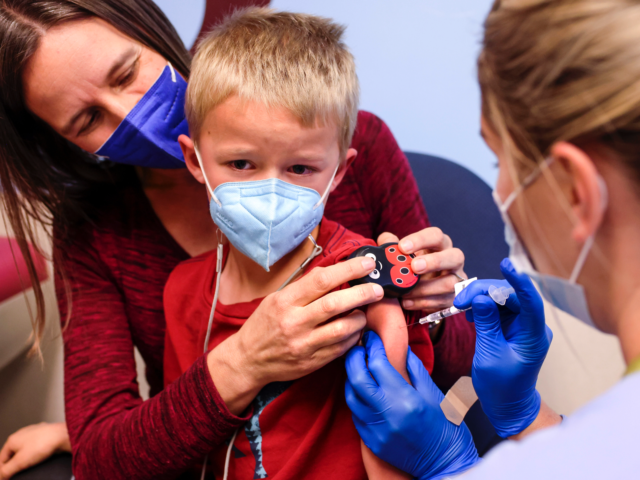Around five million children between the ages of five and 11-years old in England will be eligible to take a “low-dose” coronavirus vaccine despite the government acknowledging a low risk profile for youngsters dying from the Chinese virus.
Starting on Monday, hundreds of sites across England will begin the rollout of jabs for five million children between five and 11-years-old, after previously limiting the vaccines to youngsters deemed to be at high risk or who live with vulnerable people.
The deputy head of the National Health Service (NHS) vaccination drive, Dr Nikki Kanani, told Sky News that vaccines still “remain the best defence” against the Wuhan virus.
“My 13-year-old son has had his two vaccinations and I’ll be booking my 10-year old daughter in for hers at the earliest opportunity,” Dr Kanani vowed.
Boris Johnson’s government has admitted that otherwise healthy children are not at a high risk of becoming seriously ill from the virus, with studies from last year suggesting a coronavirus death toll for them in the low single digits in England.
However, it was decided to go ahead with extending the availability for parents or carers to vaccinate their children anyway, with the government arguing that the jabs should be considered safe in light of other countries using the vaccines on children, including the other British Home Nations of Scotland, Wales, and Northern Ireland.
Health Secretary Sajid Javid has said that “[c]hildren without underlying health conditions are at low risk of serious illness from Covid, and the priority remains for the NHS to offer vaccines and spring boosters to adults and vulnerable young people, as well as to catch up with other childhood immunisation programmes,” however.
Originally, in September of last year the Joint Committee on Vaccination and Immunisation (JCVI) said that it could not recommend vaccinating young children, explaining that the “marginal” benefits of giving children jabs were not enough to justify the “potential harms” caused by the vaccine.
Nevertheless, the JCVI said at the time that it was not in the agency’s “remit” to make the final decision, suggesting that the government must also consider the “societal” impacts of the vaccine programme, such schools being able to reopen.
In February, the JCVI updated its guidance, saying: “Although this age group is generally at very low risk of serious illness from the virus, a very small number of children who get infected do develop severe disease.”
Therefore, the JCVI recommended that the government should issue a “non-urgent” call for children to be vaccinated with two doses of the Pfizer-BioNTech paediatric vaccine, which has a lower strength than adult vaccines.
The announcement comes amid record numbers of recorded coronavirus infections in the United Kingdom, with an estimated 4.9 million believed to currently have the virus.
However, despite the apparent record, deaths have still remained well below their peak.
Follow Kurt Zindulka on Twitter here @KurtZindulka

COMMENTS
Please let us know if you're having issues with commenting.